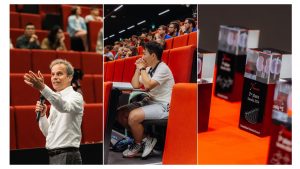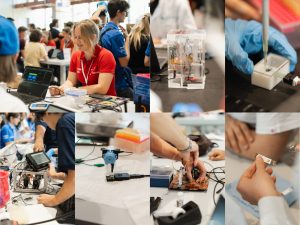UCTeam Prague, GLASense, and AixSense Teams win awards
Every year, the annual international SensUs competition on sensors for health challenges student teams from around the world to develop a biosensor for a specific analyte as well as a business plan and live demonstration of their technology. At the event’s grand finale—the SensUs event at the Eindhoven University of Technology, the Netherlands—the teams showcase their developments, exchange knowledge with other teams, and have a good time. By involving students, industry, patients, and healthcare professionals, SensUs strives to accelerate the development and innovation of biosensors and to stimulate education in this field. ECS Institutional Partner PalmSens supports SensUs.
The event
The entire event is organized by student for students, although SensUs founder Prof. Menno Prins gladly offers advice when asked. This way, students are motivated to organize their own research projects, get an idea of entrepreneurship, and learn about obstacles that hold back medical innovations.
2024 is the year of the kidney
In previous years, the competition’s target substances have been, among others, Glial Fibrillary Acidic Protein (GFAP), Interleukin-6, and Hemagglutinin. The SensUs 2024’s theme is kidney failure, also known as acute kidney injury (AKI). Globally, chronic kidney disease affects ten percent of the population, with over 750,000 people in the US alone. Kidney failure is characterized by one or both kidneys losing their renal function, namely, the ability to filter waste matter from the blood. This results in an accumulation of waste in the bloodstream, altering the ionic homeostasis of the blood. There are five stages of kidney failure depending on the glomerular filtration rate (GFR) which measures the blood filtration rates of the kidneys in (mL/min), with preliminary signs advancing to kidney failure including fatigue, nausea, and swelling. Generally, the clearance of substances that are freely filtered but not secreted or reabsorbed by the kidneys is used to estimate the GFR in clinical settings, with creatinine meeting the criteria.
Creatinine is a product of the metabolism of creatine, which is produced in the liver from three amino acids: methionine, arginine, and glycine, and stored in muscle to use as a source of energy once phosphorylated. Creatinine is normally excreted through the kidneys. Healthy kidneys are responsible for filtering creatinine out of the bloodstream, as it is a freely filtered metabolite that is not secreted or reabsorbed. Consequently, during kidney failure when the GFR reduces, there is a buildup of elevated levels of creatinine in the blood (source: sensus.org).
Support for the teams
The teams must develop an innovative biosensor for creatinine monitoring in less than a year. This is a challenging task. In the field of chemical sensors, optical and electrochemical methods are the two dominant fields. PalmSens supports the SensUs teams who chose electrochemical detection with knowledge and the EmStat Pico Development Kit. This way the teams have a straightforward way to embed potentiostat that they can include in their hard- and software environments. This helps to quickly check a few boxes on the long to-do list for a successful demonstration in Eindhoven. Judges and the audience evaluate distinct aspects.
Awards
 Of the 17 teams competing in 2024, three received four first places award.
Of the 17 teams competing in 2024, three received four first places award.
Analytical Performance Award: UCTeam Prague (Czech Republic)
The Analytical Performance Award goes to the Team with the biosensor that functions best, in terms of measurement accuracy, speed, and required sample volume.
Innovation Award: GLASense (Scotland)
The Innovation Award relates to the technological novelty of the biosensors and to how the teams worked during their development process.
Translation Potential Award: GLASense (Scotland)
The Translation Potential Award is about the teams’ plans to bring their biosensor from a prototype to a product that society can use. Will the product meet the needs of doctors and patients, and will it be suited for industrial production?
Public Inspiration Award: AixSense (Germany)
The Public Inspiration Award recognizes the team that best inspires the public. The award is based on votes from the public who see the teams’ presentations, pitches, and demonstrations.
Jurying
The Public Inspiration Award is the only award judged by the public. The others were judged in 2024 by 29 experts from academic institutions and commercial businesses evaluated the teams’ performance. More information about the jury is available here.
Outlook
Due to the ambitious objective of creating a continuous creatinine monitoring for kidney patients, the decision was made, for the first time in the competition’s history, to have the same competition topic for two consecutive years. This shall motivate the teams to transfer their knowledge to their successors, adding another experience to the unique experiences the SensUs competition offers to students.
This is perfect timing for PalmSens. With the launch of our Sensit Wearable Development Kit, we can provide the teams that reached the stage of actual field tests of continuous measurements with the perfect potentiostat.
PalmSens will again be a partner of the SensUs 2025. How about you? Learn more about the competition!
Thank you, PalmSens!
The Electrochemical Society is grateful for PalmSens’ support for the Society as a Benefactor Level Institutional Partner. For more information on ECS Institutional Partnership, contact Anna Olsen, Senior Manager, ECS Corporate Programs.


